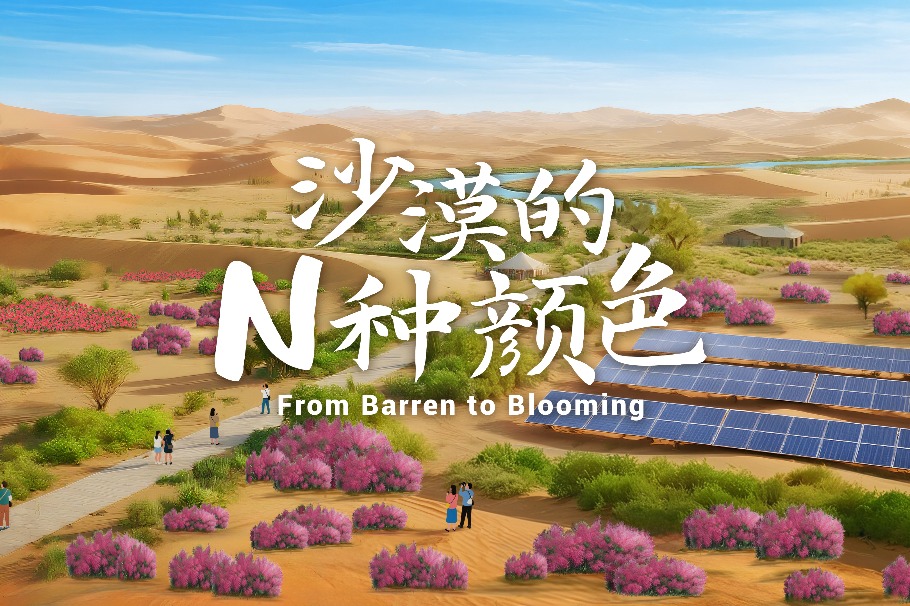Singer knows country roads take him home
The town he loves so well still inspires, as does the majesty of Xinjiang's landscapes, Chen Nan reports.

Yiqikelike in Kuqa in the Xinjiang Uygur autonomous region was once a thriving oil town. Meaning "a place where gazelles appear" in Uygur, and hidden deep in the Tianshan Mountains, Yiqikelike was once home to thousands of people who labored night and day to extract the treasure buried beneath its streets.
Zhang Zhi was born and raised in the oil town, where his parents worked. He can still recall vividly that it was covered in snow in the winter, and, as a child, he spent his days sledding with his elder brother and the other neighborhood children.
"I spent my childhood there. I think it is the most beautiful place in the world, and I still think so," the 50-year-old says.
He grew up being exposed to the cultures of the many ethnic groups that live in the area, absorbing their music and learning to play their instruments.
His dream was to become an artist and, while he did learn to paint as a child, he later became a singer-songwriter, dedicated to writing folk songs incorporating the musical elements of Xinjiang. In 2010, he joined the band Voyagers as lead vocalist and songwriter.
During a recent online event, Zhang shared stories about life in Yiqikelike and how it inspired him to create his music, which has been enthusiastically welcomed by fans.
Along with two other band members, Jin Mei, who plays the yangqin (a hammered dulcimer), and Mongolian ethnic musician Gawa, who plays the morin khuur (the horse-head fiddle), Zhang performed one of his most famous songs, Yiqikelike, which he wrote in honor of his hometown.
He says that he wrote it after he took a dombra (a two-stringed plucked instrument) to play in a valley on the outskirts of Xinjiang's Karamay city.
As the notes from his dombra mingled with the sound of the wind, he was inspired to write the song, which is about his parents, who moved from Sichuan province to work in the oilfields.
"When they came here, they were young. When they left, they were gray-haired. The song is also dedicated to all those others, just like my parents, who worked and lived there," he says.
It appeared on Zhang's debut album, Small Town Nileke, which was released in 2011. Featuring eight songs of his songs, it incorporates musical elements from Xinjiang's ethnic groups. The album won numerous awards, giving Zhang and the band the opportunity to perform at outdoor music festivals around the country, among them major events, such as the Midi Music Festival and the Strawberry Music Festival.
Music critics praised the songs as "a map of the folk music of Xinjiang" and fans were intrigued by the far-off lands depicted in them.
"I read lots of comments that touched me deeply. Many people have never heard of Yiqikelike and I am happy to tell stories about the place, and people who once lived there," Zhang says. "I was also amazed when others told me that they had also grown up there and that their parents had spent their entire lives there.
"I taught myself to play guitar when I was a teenager. I also learned to play folk instruments like the dombra from people I met in Xinjiang, who introduced me to the colorful sounds of Xinjiang's folk music," he adds.
In 2013, he released his second album, Bakhtu Port. In the winter of 2008, as Zhang was traveling to Karamay from Tacheng, where Bakhtu port is located, the scenery outside the window inspired an improvised melody. "It suddenly took me back to the boundless wilderness and snowy scenes of Bakhtu port," he says. He recorded the melody and later wrote the song, which features the guitar, the accordion and the mandolin.
Another song on Bakhtu Port, Horseman, was written after a trip to see a friend in Alashankou. They visited the house of an old Kazak man in his 70s, who played his dombra all night and told them his story of falling in love, when he was young, with a woman, who left for a far-off land after marrying another man. In his memories, the girl had black eyes and always sang softly.
"I enjoy listening to people's stories; they inspire me to write songs. The old man impressed me deeply. I wrote his love story into the song with my dombra and guitar," says Zhang, adding that his debut album was a love letter to his parents and his hometown, and the second was a diary of trips to different parts of Xinjiang, through time and space.
His third album, Sand and Dust, was released in 2019, and was inspired by a sudden sandstorm in the Taklimakan Desert.
Now living in Lijiang, Yunnan province, Zhang returns to Xinjiang to visit relatives as well as to collect examples of folk music. His life in Lijiang is simple. He gets up early in the morning and rehearses with the band members most of the day, and also composes songs.
The band's core members include bassist Wu Junde and drummer Wen Feng, but they work with a variety of other musicians, to inject a diversity of musical elements into their songs.
Zhang is now at work on his fourth album, Lost River, which is about a week he spent on a ranch in Kuqa, Xinjiang, about eight years ago.
"I met a number of different people there, including the owner of a small store and a handsome miner. The seven days I spent on the ranch felt like a dream," he says.


Today's Top News
- Meet again? Putin says: Next time in Moscow
- Zelensky to meet Trump in Washington on Monday
- Wang Yi to visit India from Monday
- Trump, Putin tout 'productive' Alaska talks without apparent breakthrough
- A year's rainfall in a single day
- Negotiation the only way out for peace in Ukraine: Editorial flash






























